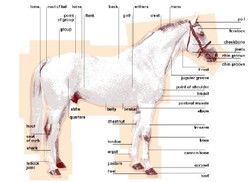Health
Body Parts
Worming
Worms are NOT good for horses. They can cause many problems.
Worms can cause...
- Illness
- Colic
- Coughing
- Diarrhoea
- Weight loss
- and sometimes even Death
This chart shows what your horse can get and at what age.
Foals | Up to Three Years | Adults |
| Threadworm | - | - |
| Large Roundworm | Large Roundworms | - |
| Large Redworms | Large Redworms | Large Redworms |
| Small Redworms | Small Redworms | Small Redworms |
| - | Tapeworm | Tapeworm |
| - | Hairworm | Hairworm |
| - | Lungworm | Lungworm |
| - | Pinworm | Pinworm |
| - | Bots | Bots |
http://www.animalherbcompany.com/articles/horse_worms.htm
Here are some different types of worms...
Bots
Large Roundworms
Lungworms
The Large Redworms
The Small Redworms
The Tapeworms
Threadworms
To treat worms, you can feed your horse wormer. You can buy wormer just about any place that has farmer/horse supplies.
Food
Grass & Hay - horses eat grass till it gets to the dirt. put hay out if you don't have a lot of grass and in the winter
Timothy Hay - dried, chopped, and compressed, pieces of hay
Barley - good source of nutrition, good for in the winter
Bran - easily digested
Beet Pulp - if you have a really skinny horse, use this to fatten them up
Oats - gives your horse energy, easy to digest
Sweet Feed - molasses with chopped corn, pellets, and oats
Pellets - they are a mixture of oats or barley, corn, vitamins, and minerals with a little bit of molasses
